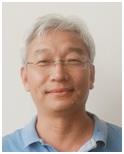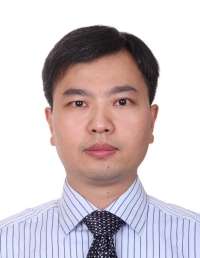
(4) Nonlinear Dynamics and Control: Zhengguang Wu, Zhejiang University, China (Chair)
4.1. Speaker: Prof. Deyuan Meng, Beihang University, China

Talk Title: Iterative learning control for nonlinear systems
Abstract: In this talk, we discuss fundamental convergence problems of iterative learning control for nonlinear systems. We first introduce brief reviews of ILC, including what ILC is, why it is required, and how it is technically formulated. Then we present analysis methods and convergence results of robust ILC for nonlinear systems, where we consider both global and local Lipschitz nonlinearities. We next provide simulation examples and experiment results on a hand rehabilitation robot to demonstrate the effectiveness for robust ILC of nonlinear systems. Finally, we give some concluding remarks about ILC for nonlinear systems.
Biography: Prof. Deyuan Meng received the B.S. degree in Mathematics and Applied Mathematics from Ocean University of China (OUC), Qingdao, China, in June 2005, and the Ph.D. degree in Control Theory and Control Engineering from Beihang University (BUAA), Beijing, China, in July 2010. He is currently with the Seventh Research Division and School of Automation Science and Electrical Engineering at Beihang University. From November 2012 to November 2013, he was a visiting scholar with the Department of Electrical Engineering and Computer Science, Colorado School of Mines, Golden, CO, USA. His research interests include iterative learning control, multi-agent systems, and social opinion dynamics. He was a recipient of the “Best Paper Award” from the IEEE 7th Data Driven Control and Learning Systems Conference in 2018.
4.2. Speaker: Prof. Mou Chen, Nanjing University of Aeronautics and Astronautics, China

Talk Title: Multi-approximators Based Control and Application
Abstract: In this talk, the related methods of multi-approximators based control are given for the uncertain nonlinear system. For the system uncertainty, unmeasured states, time-varying unknown disturbance and system fault of multi-input and multi-output uncertain nonlinear systems, the neural network was applied to approximate the nonlinear systems uncertainty, the nonlinear disturbance observer was used to estimate the time-varying unknown external disturbance, the nonlinear state observer was designed to estimate the unmeasured system states and the fault estimator was developed to estimate system fault. Several coupling designs were given for the heterogeneous approximations. The outputs of the different approximatosr are applied to the design of robust controller for uncertain nonlinear system, so as to ensure the closed-loop stability of uncertain nonlinear system under the influence of system uncertainty, time-varying external interference, unmeasured states and system fault, and to improve its control performance. At the same time, the application of multiple approximators cooperative control in robust flight control of aircraft was discussed.
Biography:Prof. Mou Chen is now a professor and vice Dean of the College of Automation Engineering, Nanjing University of Aeronautics and Astronautics. He received the BSc degree and the PhD degree in Nanjing University of Aeronautics and Astronautics. He was awarded by the National Science Fund for Distinguished Young Scholars in 2018 and was elected to the Program for New Century Excellent Talents in University of Ministry of Education of China in 2011. He visited the Loughborough University, UK, from November 2007 to February 2008. He was a postdoctoral fellow in the National University of Singapore, Singapore, from June 2008 to September 2009. He was a senior research fellow in the University of Adelaide, Australia, from May 2014 to November 2014. He has actively served in the editorial boards of a number of international journals as an associate editor, including IEEE Transactions on Systems, Man, and Cybernetics: Systems, IEEE Access, Neurocomputing, International Journal of Advanced Robotic Systems, Chinese Journal of Aeronautics, SCIENCE CHINA Information Sciences, etc. He was a PI of 20 projects in the last five years, including the General Program of National Natural Science Foundation of China, and the Project for Jiangsu Natural Science Foundation of China, etc. He was awarded two Second Prize in China's State Natural Science Award (ranking second), one First Prize in Natural Science Award of Ministry of Education (ranking second), two Second Prize in National Defense Science and Technology Progress (ranking first), and applied over 20 invention patents. He has published one English monograph and one Chinese monograph. He was published over 100 academic papers, more than 90 papers were published or accepted by international journals among these papers.
4.3. Speaker: Prof. Zhaojing Wu, Yantai University, China

Talk Title: Random PWM controls of robots driven by DC motors
Abstract: In this report, the problem of modeling and stochastic tracking is presented for robots driven by DC-motor with PWM amplifier. The main work consists of Five aspects. 1) Local stability of Random nonlinear system is invaginated. 2) Equivalence of a given continuous control and a PWM strategy is proved, which can be achieved by a physical circuit. 3). Equivalent control for robot with CD-motor is obtained by using vectorial backstepping method, and an observer of current is presented. 4). PWM controller of two levels is extended to the case of three levels by using H-bridge circuit. 5).Virtual reality simulations are presented to demonstrate the efficiency of proposed method.
Biography: Prof. Zhaojing Wu received the M.S. and Ph.D. degrees from Qufu Normal University and Northeastern University, in 2003 and 2005, respectively. He is currently a Professor in the School of Mathematics and Information Science of Yantai University and Distinguished Professor of Taishan Scholar Program of Shandong Province. He was the outstanding reviewer for IEEE Transactions on Automatic Control in 2012 and best conference paper awarder of IEEE ICCSS 2016. His research interests include nonlinear control, adaptive control, stochastic stability analysis, stochastic dissipative systems, stochastic Hamiltonian systems, stochastic Lagrangian systems and applications on robotic control. He is the author of 18 papers (including 4 regular papers) published in IEEE Transactions on Automatic Control or Automatica.
4.4. Speaker: Prof. Jian Chen, Zhejiang University, China

Talk Title: Identification of a Moving Object’s Velocity and Range With a Static-Moving Camera System
Abstract: In this talk, a nonlinear observer strategy is introduced to asymptotically identify the velocity and range of the feature points on a moving object using a static-moving camera system. Specifically, the camera system consists of a static camera and a moving camera. The observers are developed in a sequential way. First, nonlinear observers are designed to identify the scaled velocity of the feature points and the angular velocity of the moving camera. Second, based on the estimated velocities, the range of the feature points is identified by a reduced order estimator. Homography-based techniques are used in the auxiliary state construction and the observer design. With the estimated scaled velocity and range, the motion and structure of the object can be obtained with respect to both cameras. The proposed approach does not require the motion constraint or apriori geometric knowledge of the moving object. Furthermore, Lyapunov-based analysis is used to prove that the estimators asymptotically identify the velocity and range of the feature points.
Biography: Prof. Jian Chen received the B. E. degree in measurement and control technology and instruments and the M.E. degree in control science and engineering from Zhejiang University, Hangzhou, China, in 1998 and 2001, respectively, and the Ph.D. degree in electrical engineering from Clemson University, Clemson, SC, USA, in 2005. He was a Research Fellow with the University of Michigan, Ann Arbor, MI, USA, from 2006 to 2008, where he was involved in fuel cell modeling and control. In 2013, he joined the Department of Control Science and Engineering, Zhejiang University, where he is currently a Professor with the College of Control Science and Engineering. He has been supported by the Chinese Recruitment Program of Global Youth Experts since 2013, and the Key Program of National Natural Science Foundation of China on Modeling and Control of Fuel Cell vehicles since 2015. He has published more than 110 peer reviewed papers and one monograph. His research interests include modeling and control of fuel cell vehicles, visual servo techniques, and nonlinear control.
4.5. Speaker: Prof. Chanying Li, Chinese Academy of Sciences, China

Talk Title: Feedback limitations in nonlinear discrete-time control
Abstract: An interesting phenomenon occurs when one attempts to control systems with output nonlinearity growing faster than linearity, where similarities between the continuous- and discrete-time cases of adaptive control no longer exist. It is generally known that a large class of continuous-time nonlinear parametric systems, regardless of how fast the growth rate is, can be globally stabilized by the nonlinear damping or back-stepping approach in adaptive control. However, fundamental difficulties arise for the discrete-time case. These difficulties are caused by the inherent limitations of the feedback principle in dealing with uncertainties, which means that systems with uncertainties beyond the feedback capability cannot be stabilized by any discrete-time feedback control law. This talk is aimed at the identification and control of discrete-time nonlinear parametric systems and trying to give an appropriate characterization of feedback limitations.
Biography: Prof. Chanying Li received the B.S. degree in Mathematics from Sichuan University in 2002, and the M.S. and Ph.D. degrees in control theory from Academy of Mathematics and Systems Science, Chinese Academy of Sciences, in 2005 and 2008, respectively. She was a Postdoctoral Fellow at the Wayne State University from 2008 to 2009, and the University of Hong Kong from 2009 to 2011. She joined the Institute of Systems Science at Chinese Academy of Sciences in 2011, and is currently a professor at the Key Laboratory of Systems and Control, Chinese Academy of Sciences. Her current research interests include the maximum capability of feedback, adaptive nonlinear control, system identification and stochastic control systems.
4.6. Speaker: Prof. Bin Xu, School of Automation, Northwestern Polytechnical University

Talk Title: Robust Adaptive Control of Hypersonic Flight Dynamics
Abstract: This talk addresses the control of hypersonic flight dynamics on the basis of intelligent learning and disturbance observer in presence of system uncertainty, time-varying disturbance and system constraint. The control scheme using parameter estimation, composite learning, disturbance observer and Barrier Lyapunov Function will be discussed. The uniformly ultimate boundedness stability is analyzed via Lyapunov method. Through simulation verification, the proposed approach obtains better performance with higher accuracy for the hypersonic longitudinal dynamics.
Biography:Prof. Bin Xu is Professor with School of Automation, Northwestern Polytechnical University. He received the B.S. degree in measurement and control from Northwestern Polytechnical University, China, 2006 and the Ph.D. degree in Computer Science from Tsinghua University, China, 2012. He visited ETH Zurich from Mar 2010 to Mar 2011 and from Feb 2012 to Jan 2013 he was Research Fellow with Nanyang Technological University. From Jul 2012 until now, he is working at School of Automation, Northwestern Polytechnical University. His research interests include computation intelligence, intelligent control and adaptive control with application to flight dynamics, robotic systems. He is currently associate editor of Neurocomputing, International Journal of Advanced Robotic Systems, and Chinese Journal of Aeronautics.